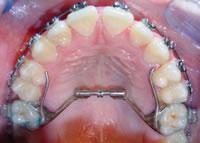EXPANSION APPLIANCES (EXPANDERS)
Maxillary expansion (expansion of the upper jaw) is sometimes required as part of orthodontic treatment to improve the way that the teeth fit together. When maxillary expansion is necessary, an expansion appliance will be attached to the teeth for a period of a few months. Usually, the expander will be attached to the upper molars and cannot be removed by the patient. An expander is an orthopedic appliance which means that it will produce changes to bone tissue. Specifically, expanders used in the mouth will stimulate the body to produce more bone tissue in the roof of the mouth, or palate. A narrow palate can be widened in this way. Since all bones in the body change with age, expanders are usually only used in children and teenagers.
The expander has an activation screw in the middle of the appliance with a special keyhole. An expander key is used by the patient, parent, or other person to turn the screw and activate the appliance. The orthodontist will instruct the patient on how frequently to activate the expander. Each time the activation screw is turned, a gentle pressure will be applied to both sides of the palate. Over a period of a few weeks, this pressure is what produces a wider palate.
After the expander is first placed in the mouth, speech may be affected for a few days. It may be helpful to read aloud from a book to train the tongue to function normally with the appliance. Some patients also notice a need to “slurp” before swallowing because of increased salivary flow, but this sensation usually subsides within a few hours after placement.
Patients who receive an expander should avoid chewy or sticky foods which might dislodge the appliance. If the appliance does become loose, no additional activation turns should be made and an appointment should be scheduled as soon as possible to reattach the expander. If the appliance becomes completely dislodged, schedule an appointment for reattachment, and bring the expander to that appointment.

Since the expander will widen the roof of the mouth, it is normal for a space to develop between the two upper front teeth. This space may remain for several weeks, but will eventually be closed. It is also normal to experience a tingling sensation behind the cheeks or in the bridge of the nose. This usually lasts for no longer than a few minutes, immediately after activation turns. It is not normal to experience any prolonged soreness or discomfort. If any discomfort persists for more that a few minutes, activation turns should be discontinued and the orthodontist should be notified.











